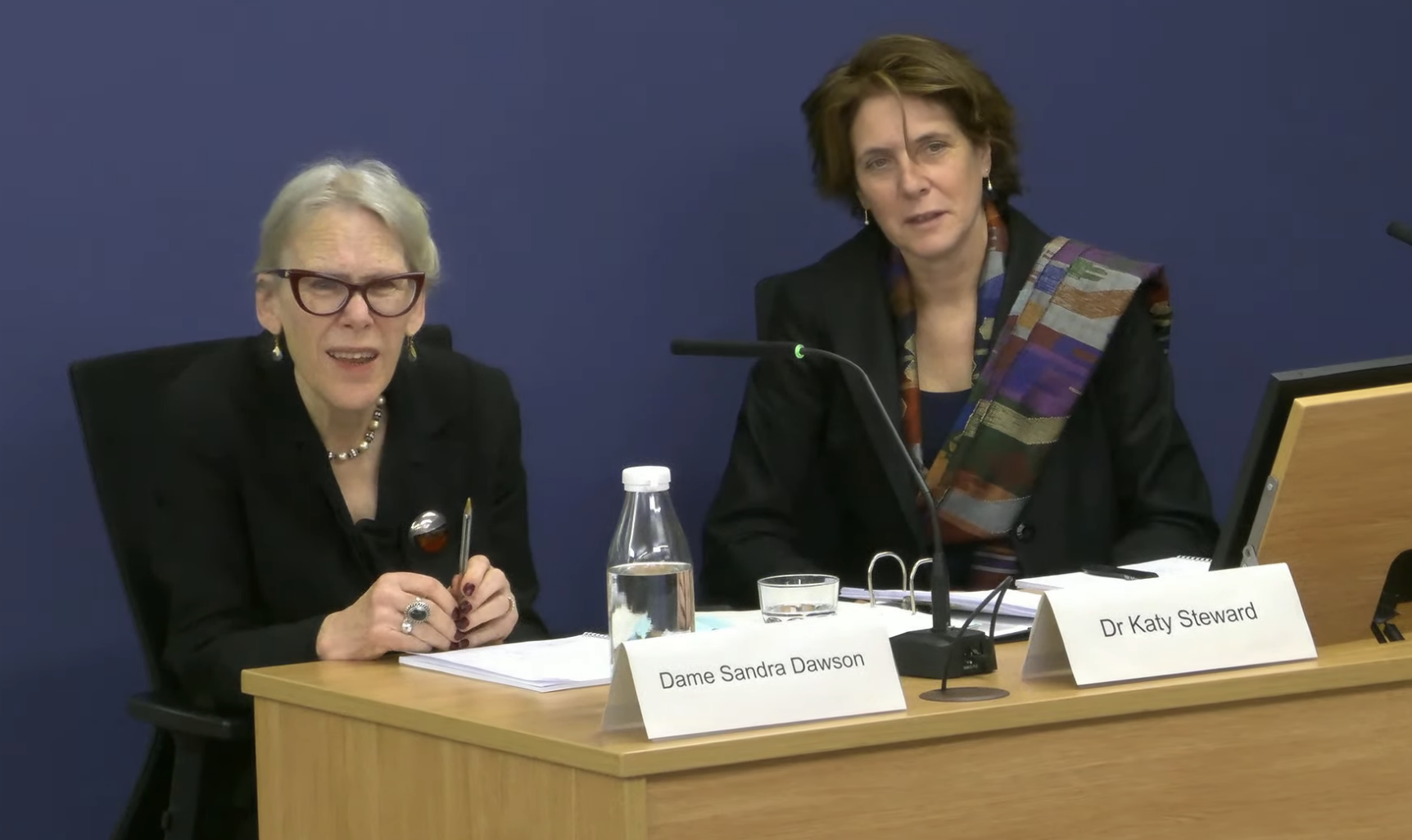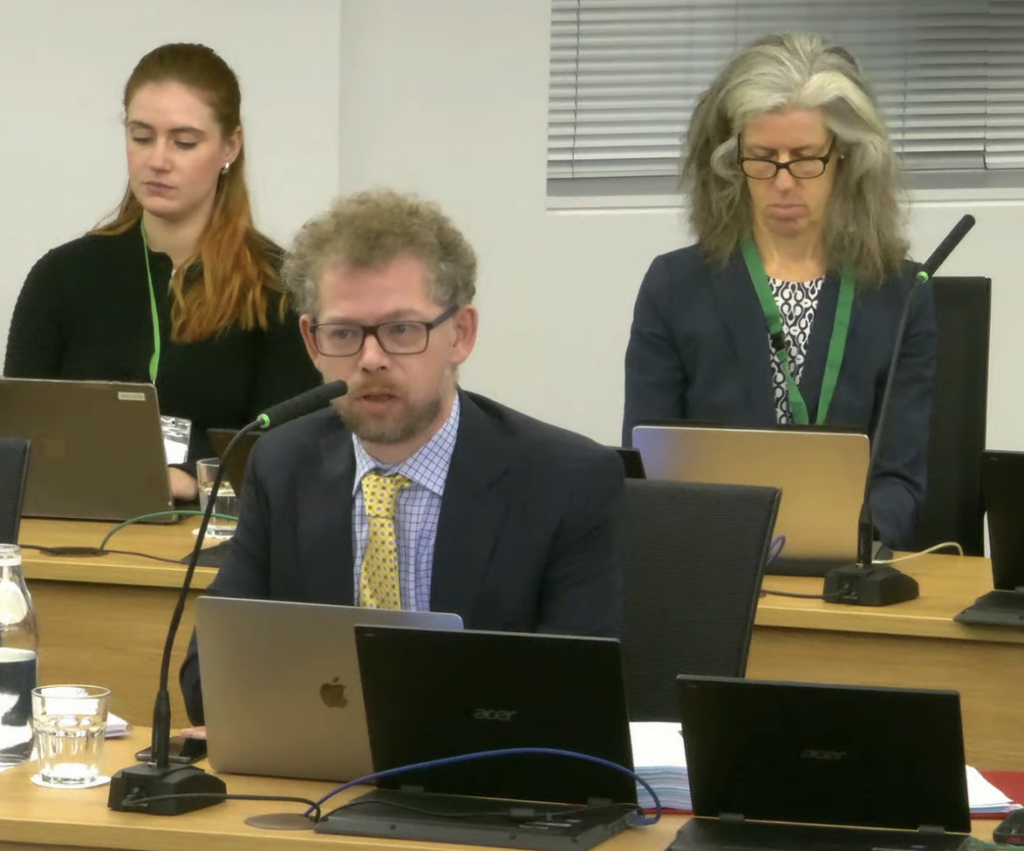
I am publishing this blog post largely as an excuse to use one of my favourite screenshots of the entire Inquiry. See above.
Corporate governance experts Dame Sandra Dawson and Dr Katy Steward wrote two lengthy reports about the Post Office’s corporate governance responsibilities and failings when it came to the scandal. On 12 and 13 November they were invited to answer questions about them.
For a deep dive into their findings, please read this forensic and frankly much more sensible substack post by Professor Richard Moorhead. For those of you who sometimes just like a snapshot of esoteric weirdness, please read the following exchange which took place between Paula Vennells’ barrister Paul Casey and Dame Sandra Dawson during the Inquiry on 13 November, as Dr Steward looked on in wonder.
Remember, Paula Vennells is currently engaged in potentially preparing a criminal case defence which might ultimately stop her going to jail, being convicted, or even charged with any offence. Anyway, here goes:
Paul Casey: I’m going to ask some questions on behalf of Paula Vennells, the former CEO. I’m going to ask two sets of questions. The first are questions are based on assumed facts, which I’m going to ask you to assume without asking you to accept them, on various matters. Then my second set of questions will be about the role of the general counsel.
Firstly, I’d ask you to assume that, in between Board meetings, Ms Vennells and Ms [Alice] Perkins [former Post Office Chair] were in regular contact about the matters covered in your second report. My question is: on the assumption that that is correct, that they were in regular discussions about Second Sight Report and the prosecution case review, would that, in principle, have assisted Ms Perkins as Chairman to determine what issues should come before the Board?
Dame Sandra: As I understand the question, if we assume they were in regular contact, would we assume that that
would mean that Ms Perkins was appraised of matters to been before the Board; was that the question?
PC: Well, the question is slightly more general than that, that on the assumption that they were in regular contact between Board meetings, would that contact have assisted Ms Perkins in deciding what issues should come before the Board for discussion?
DS: I imagine it would.
PC: The next assumption I want to put to you is this: whilst Second Sight [independent investigators commissioned by Perkins and Vennells] were working on the postmaster cases between 2012 and the publication of their report in July 2013, there was a core team from Post Office who were liaising with Second Sight. I want you to assume that that core team consisted of, firstly, a Senior IT Manager; secondly, a Manager from the Accounting Department of Post Office, which dealt with postmaster complaints and disputes; thirdly, a Senior Manager from Network which liaised with the Branch Network; and, fourthly, Susan Crichton, the General Counsel. Now, you spoke yesterday of the importance of sharing knowledge horizontally across the business and my question is: on those assumed facts, would that be an example of knowledge being shared horizontally in relation to the issues covered in your second report?
DS: If it were to exist it would be an example that there was a structure in which it was possible to share information. Whether or not that information was actually shared, I can’t say.
PC: Yes, I’m not asking you to assume that.
DS: There is a structure there, apparently.
PC: Yes. So my next related assumption is that that same team considered the Second Sight Interim Report when it was published in July 2013, and that the information that was presented to the Executive and the Board about the Second Sight Interim Report, was derived from the work product of that team. So the question is again: would that be an example of a structure where knowledge was to be shared horizontally?
DS: But I don’t believe we saw any evidence of that.
PC: I’m not asking you whether you saw any evidence of it; I’m asking you to assume that that was the team who, on behalf of Post Office, considered the merits of the Second Sight Interim Report.
DS: If you’re saying to me: if it were to have been considered by people from different functions,
would that have been example of multi-functional consideration…

PC: Yes.
DS: …well, self-evidently it would.
PC: Thank you very much. I want to move on to the role of the General Counsel, please, and could we bring
up WITN10010101 [Post Office job description as provided to incoming General Counsel Jane MacLeod in 2015]. Is this a document you have seen?
DS: Is this the 2015 document?
PC: Yes.
DS: Yes, I have.
PC: Now, if we go over to the second page of this document, the first two paragraphs contain a summary of
the role and responsibilities of the General Counsel. It says: “The General Counsel is responsible for managing the
Company Secretariat, Internal Audit, Legal, Risk and Compliance and Security Teams.” Then in the second paragraph, it says: “The Legal Team of 12 are responsibility for managing all aspects of legal risk, identifying and solving strategic and operational legal issues, and providing understandable, accurate and timely advice to the business on a very wide-ranging and changing set of complex issues, which are frequently novel and to short deadlines.” Now, you’ve said today that you haven’t looked into the regulatory rules by which general counsel must operate.
DS: Yes.
PC: I take it you’ve also not looked into the question of the legal duties that they will owe to Post Office as their client.
DS: We’re… no, you’re… I have to not looked in detail at the role of the General Counsel in this
regard. That’s right. I should say that the first paragraph is, of course, this is the Post Office’s construction of the role of the General Counsel.
PC: Yes
DS: Yes.
PC: What I’d just like to ask you about, though, are the expectations that the Board would have of what a General Counsel would bring to them. So, just looking at that second paragraph, it identifies three functions. The first of those is responsibility for managing all aspects of legal risk. Do you agree it would be an expectation of the POL [Post Office Ltd] Board that the General Counsel would collate legal risks to them?
DS: Yes, nothing can abrogate the responsibility of the Chief Executive for overall responsibility. One can define the responsibility of the director of marketing, the director of strategy, the finance director, unless he or she is a member of the board, and the general counsel, one can define their responsibilities but that responsibility is held within an executive team, and the Chief Executive is the responsible person for that executive team. I don’t know if that’s relevant to your question but it seemed relevant to me.
PC: Thank you. My question is: would you agree that a Board of POL would have an expectation that the General Counsel would alert them to legal risks?
DS: Absolutely.
PC: Mr Aujard, who was one of the General Counsel during Ms Vennells’ tenure, agreed with a proposition during his oral evidence that a General Counsel should be proactive in identifying legal risks to the business; do you agree with that?
DS: Indeed I do. I agree that, above all, all the executive directors, and some with special responsibility, should be proactive, creative, do their job. I completely agree with that.
PC: Would you agree that the reason for proactivity in identifying legal risks is that the GC may be aware,
by nature of their profession, of risks of which a lay board and a lay executive may well be unaware?
DS: I’m sorry, I didn’t catch that.
PC: Would you agree that the reason why a GC needs to be proactive in alerting the business to legal risks that – and my emphasis is on legal – is that the GC may well be aware, because of their profession, of risks of which a non-lawyer may be unaware?
DS: Indeed.
PC: Now, the second role identified in this document of the GC is solving strategic and operational legal issues. Again, do you agree a board would have an expectation that that is something that a GC would do?
DS: As I say, within the overall structure of what an executive team is, with the Chief Executive being ultimately responsible, I completely agree with this statement…
PC: And…
DS: …because it’s their statement. I think it’s very important to know that this is what POL determined in 2015 that they wanted of their General Counsel and it would be reasonable for the Board to believe that what they wanted would be what they got.
PC: Obviously a General Counsel may have spent their professional life in one particular area of the law. Do you think that a General Counsel should, if an issue crops up that they are not familiar with, engage external counsel to assist them?
DS: I do.
PC: Then the third role of the General Counsel set out here is to provide understandable, accurate and timely advice to the business. Can you agree that that would be an…
DS: I do.
PC: …would be an expectation? Do you agree a board would have an expectation that a GC who was performing these roles, unless they knew something to the contrary, would be performing them competently?
DS: The assumption would be that an executive director, a member of a senior team, was performing their role appropriately, and that, if they weren’t, it would be picked up through performance management matters.
PC: If a board received a paper from the GC, from which it was clear that the GC had received external advice and was providing a summary of that external advice in their paper to the board, wouldn’t the assumption of the board be that that paper contained what they needed to know?
DS: That would be a reasonable assumption.
PC: Thank you very much, I’ve no more questions.
Go figure.
The journalism on this blog is crowdfunded. If you would like to join the “secret email” newsletter, please consider making a one-off donation. The money is used to keep the contents of this website free. You will receive occasional, irregular but informative email updates about the Post Office Horizon IT scandal.

Leave a Reply